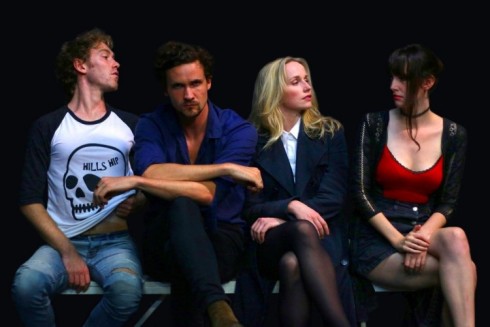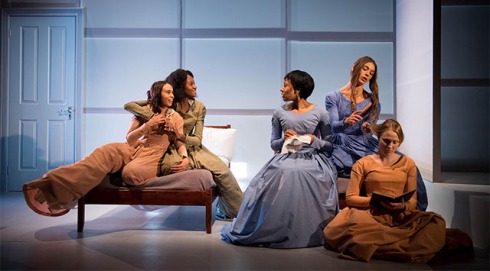Talk to virtually anyone in the theatre world and you soon learn that there is a grand tradition of self-obsession.
This production refuses to honour this tradition, instead presenting the audience with a simple, engaging entertainment.
I, however, uncomfortable with such radicalism, will adhere to the time tested way.
I would not choose to direct this play – because it’s so difficult.

Photo by Andrew Langcake
Down an Alley Filled with Cats by Warwick Moss was first produced in 1984 and won the Premier’s Literary Award before seasons in the West End and New York. It’s a comic thriller. And that’s what makes it so challenging – getting the balance right between the playful and the serious.
This production has a good shot at it, but I’ll be honest, it took me a long time to pick the tone. Maybe I’m just slow. (See, it’s all about me.)
Actors Gabriel Egan and William Jordan easily hold our attention, but I suspect opening night nerves may have played a part in making vocal performances a little muddied.
The two participants in this cat and mouse game to possess a valuable object are (conveniently) locked together in a room. Dramatists love this trick of offering the characters no possibility of escape, and audiences often go along with it as it mirrors their experience of the theatre. But it’s a trick that demands careful consideration of the physicality of the performances; it’s inevitable that close proximity will have to reflect both intimacy and antipathy, and in so far as this genre is a distant cousin of naturalism, there’s enormous pressure to get the pacing right to make this appear believable.
Moss’ script uses other classic tricks – you might end up wondering with it’s intricately plotted or all just a sleight of hand – but it will lead to interesting post-show discussions. Were you taken in or not? Of course, if you’re part of the grand theatrical tradition, you never were, not for a second.
Paul Gilchrist
Down an Alley Filled with Cats by Warwick Moss
Directed by Tom Richards
at King Street Theatre until 13 May
tix and info here




